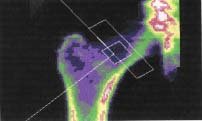Hip fracture - Osteopenia, Osteoporosis
Hip fracture is a serious medical condition Only about 1 in 4 persons recover completely after this kind of bone break.
You can improve your chances of full recovery if you understand the condition and understand the rehabilitation process. Why? Because understanding leads to better rehabilitation co-operation.
Most of these fractures
are breaks in your femur, the large bone that extends from your knee to
your hip. There are several places where the breaks can happen along this bone
- There can be a break at the femoral neck. That is in the upper part of your femur. The4 femoral neck connects to the part of your hip that has a ball at the end - that ball fits into your hip socket.
- The second are for fracture is in the intertrochanteric region. This area is the part of your upper femur that juts outward from the hip socket.
Both these area of common areas of bone fracture.
How do I know if I have fractured my hip?
We expect that a fracture will be very evident...but that is not always the case.
If you have any of the following symptoms, you may have a hip fracture and should call for medical help as soon as possible.Yes, it is OK to call 911 if you have had a fall or have banged your hip hard and have at least one of the following symptoms:
- severe pain in your hip or in your groin area
- inability to put weight on your leg
- shortness of the leg on the side you injured
- the leg on the side you injured turns outward
If you experience any of the above after falling or hitting your hip hard, you may have a hip fracture and you should not try to walk or put weight on the injured leg.
NOTE: If your bones are especially weak because you have lost bone density ( Osteoporosis) you could have a sudden fracture of your hip just from standing up. This can also happen if you have spent a number of days in bed at home or at the hospital.
Why?
Our bones need to have stress put on them in order to stay strong. Even the astronauts lost bone density when they were floating 'weightless' during space travel. Lying in bed or floating/swimming does NOt put stress on your bones. That is why 'bed rest' and swimming as one's only exercise can lead to weakened bones.
My own mother suffered a hip fracture soon after coming home from a long hospital stay. We realized too late that doing some sort of weight bearing exercise during her long stay was important. (NOTE: Pilates is an exercise program was originated for patients confined to bed. You can read more about Pilates by clicking:
Prevention of hip fracture

You do not want this to happen to you. The best remedy for hip fracture is PREVENTION.
- You want to have your bone density monitored by having a Dexa scan at leastevery two years to know if your bones are becoming too thin.
- You want to be sure that you engage in Weight bearingexercise to maintain and increase bone density.
- If you are becoming frail and your hip bone density is not good, you may find that you should be Using hip protectors to prevent hip fracture
- And there are some easy exercises that you can do in your kitchen each morning or evening Balance and co-ordination exercises take only 5 minutes but very important to do regularly after age 45.
- You also need to fall proof your home and/or work place. Take up scatter rugs. Clear clutter. Make sure there are no wires in walking spaces. Install a night light in your bedroom and bathroom. And buy a slip proof mat for your shower, bathtub and use one as a bathmat.
Recovering from a hip fracture usually involves lengthy rehabilitation. You really want to be follow your physicians directions and when you are given physical therapy, you do want to be very faithful to any exercises you are given. You will probably need a cane or walker or crutches for some time but if you are faithful to your physical therapy, you may be able to discard these after a period of time.
Your determination and patience are needed for your recovery and regaining mobility.
To read how to increase the strength of your bones so you are less likely to have a fracture, go to Osteoporosis Osteopenia treatments for pharmaceutical treatments or to Osteopenia Osteoporosis Natural Treatments
